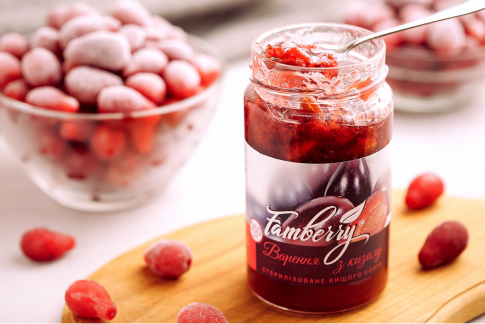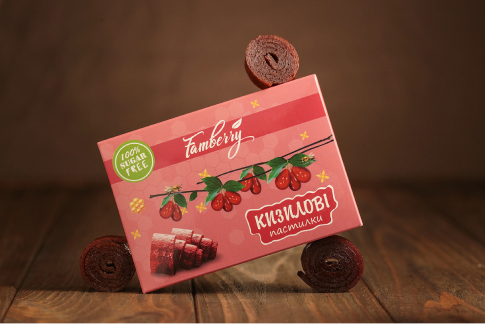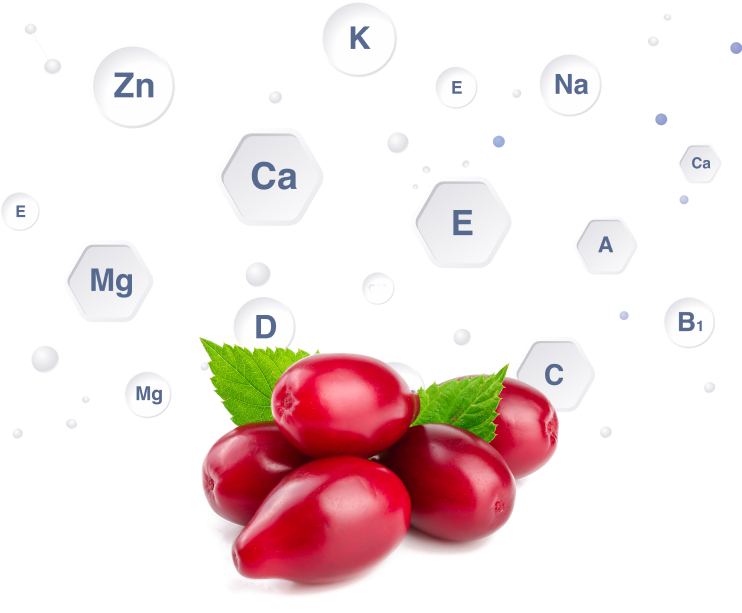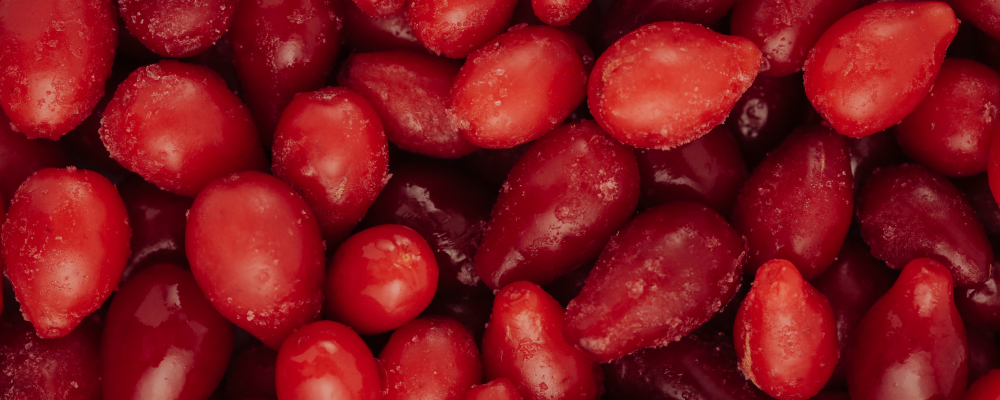ABOUT US
2017
Since 2017, the company is a member of the association "Organic Ukraine", since 2013 is a member of the Zaporozhye Chamber of Commerce and Industry of Ukraine.
During our work, we managed to visit many national and international exhibitions, such as RIGA FOOD 2017 (Latvia, Riga), Interfood & amp; Drink 2017 (Bulgaria, Sofia), Polagra 2018 (Poland, Poznan), Asian, such as FOODEX Japan (Japan, Tokyo), Sial (France, Paris), Gulfood (United Arab Emirates, Dubai) and Anuga (Germany, Cologne).
2018
In April 2018, work began on the construction of its own warehouse for low-temperature storage of products with a total working volume of 100 tons. The launch of the facility for freezing and low-temperature storage is scheduled for the end of September 2018.
2018
In June 2018, a greenhouse was built on the farm using modern robotic technologies to maintain the microclimate and a certified nursery for 1,500 dogwoods was established.
In order to support modern farming methods and the fastest possible introduction of agrotechnical organic achievements of leading experts in this field, from the very beginning of the garden, company representatives attend most important events for the development of organic fruit and berry farming in Ukraine and abroad.


PROSPECTS
Every day we work on expanding the range of products made from organic berries, in order to fully satisfy the consumer desires and preferences of our customers. In May 2018, experimental work began on the use of honey in some products instead of sugar. The taste of this product is highly appreciated not only by our experts, but also by Japanese consumers.
The result of this experiment was the introduction of dogwood jam on honey in the industrial production of a commercial batch. In the same period, studies began on oil obtained from the seeds of dogwood fruit, as well as dogwood puree for the possibility of its use in cosmetology as a regenerating and restorative means.
Preliminary analysis has shown excellent results and, soon, we will be able to please our customers with new products based on dogwood oil. The most long-awaited product of dogwood, perhaps dogwood wine, for its production requires aging, literally and figuratively. The most diligent and patient winemakers will have a truly wonderful and fragrant drink at the end. Dried fruits, candied fruits, honey products, sublimated drops, sublimated powder, lozenges, meat sauce, fish sauce, fruit juice and nectar and juice - a lot of work ahead, interesting research and accomplishments. Follow our news on official page facebook
CORN - A MEDICINAL PLANT
Dogwood has long been known as an attractive wild and garden crop with valuable nutritional and medicinal properties. In Chinese and Tibetan medicine, in ancient Greece, in Asian countries, dogwood is mentioned in the first medical treatises long before our era. It has been widely used to treat many diseases. Moreover, all parts of the plant were used - from roots, bark, branches and leaves to flowers, fruits and seeds.
In ancient medical treatises it was said: dogwood improves appetite and strengthens the immune system, helps with frequent urination, fever, tinnitus, lumbar pain. Decoctions of dogwood bark and leaves increase the body's defenses.Decoctions of dogwood leaves drive bile and urine. Decoctions of dogwood bark with barley flour, when applied topically treat abscesses.
In modern folk medicine, dogwood fruit is used as an anti-inflammatory and antipyretic agent with fever, to strengthen the body's defenses. Infusion of dogwood leaves is used in folk medicine as an antimicrobial agent for gastrointestinal disorders. The flesh of fresh fruit is applied in the form of compresses to painful areas. In Chinese folk medicine, dogwood is used to treat tuberculosis and lumbar pain. In America, the roots and bark of the plant are used as a coffee substitute. Dogwood is believed to have anticonvulsant properties.

The wide range of action of dogwood is due to the large number of biologically active substances of different classes in all parts of the plant. As a result of many pharmacognostic studies found the presence of 40 volatile substances in the leaves and 52 substances in the fruits of dogwood, of which common to the leaves and fruits of dogwood were 20 substances - some hydrocarbons, furfural, 2-methoxy-4vinylphenol, eugenol, capric, lauric, myristic and linolenic acid. The content of 30 compounds was identified and determined in the dry leaf extract: 7 organic, 5 aromatic and 13 fatty acids, 3 terpenoid compounds, 1 heterocyclic aldehyde, 1 carboxylic acid derivative, as well as 19 macro- and microelements, 6 macroelements - K , Ca, Mg, Na, P, Si; 13 microelements - Fe, Mn, Cu, Zn, Al, Pb, Sr, Ni, Mo, Co, Cd, As, Hg. The content of these elements in the leaf is 5636mg / 100g. It is also possible to note a large amount of rutin in the leaves and in the flowers of dogwood - 850 mg and 1580 mg, respectively. In addition, the leaves contain essential amino acids - arginine - 0.87%, threonine - 0.69%, valine - 0.90%, methionine - 0.47%, isoleucine - 0.76%, leucine - 1.2%, phenylalanine - 0.75%, histidine - 0.38%, lysine - 0.59%. CO2 extract of dogwood bone showed a high content of fatty acids, among which are arachidonic, linolenic, behenic, meristoleic, myristic, gadoleic, palmitoleic acid, and the largest percentage is linoleic and oleic.
After reviewing pharmacognostic and toxicological studies over the past two decades, it can be argued that interest in this plant is growing every year. Experimental studies in mice have shown that dogwood fruit extract has antithrombotic effects, prevents liver and kidney tissue damage, and dogwood fruit prevents testicular damage to methotrexate. Also, experimental studies have shown that extracts of dogwood fruit have a neuroprotective effect, and dogwood leaves - pronounced immunomodulatory properties.
Dozens of clinical studies confirm that the biologically active substances of dogwood fruit play an important role in the prevention of atherosclerosis, lowering blood sugar, lipid profiles and reducing the accumulation of fat in the liver. Dogwood has antimicrobial, antiparasitic, anti-inflammatory, antioxidant, antitumor, choleretic, diuretic effect, and also has a protective effect on the liver, kidneys and cardiovascular system in gout, obesity. Placebo-controlled studies have shown that dogwood fruit has a hypoglycemic effect, improves the glycemic index in patients with type II diabetes. Determined antidiabetic properties of dogwood fruits - alcoholic extracts of dogwood leaves have a stronger hypoglycemic effect than the drug metformin.
In the review "Therapeutic use and pharmacological effects of dogwood" we read: berries from several species of Cornus improve liver and kidney function, have antibacterial, antimicrobial, antiallergic, antihistamine and antimalarial properties. The results of microbiological studies showed that the extract of dogwood leaves has a high antimicrobial activity against coccal flora, enterobacteria and spore-forming bacteria and fungi in 4.7 times more than tincture of St. John's wort. It can be used to treat infectious diseases of the gastrointestinal tract, and its mild diuretic effect is equal to the action of lespefril in the same dose.
Summing up a brief review of scientific research of dogwood, we can talk about the broad prospects for the use of this culture not only as a medicine, but also as a berry, insufficiently known to the average consumer for its healing properties. Consumption of dogwood can prevent many diseases of the modern world, such as beriberi, reduced immunity, diabetes, cardiovascular disease, metabolic disorders and others.
Therefore, let this berry be a frequent guest at your table and bring health and healing to your family.






